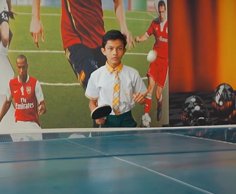We’re on your favourite socials!
We’re on your favourite socials!

Our objective is to produce academically competent persons with real-life experiences when our kids leave our school doors after completing their school career. They are future-ready with a skill set that will be required in their Next Gen careers as a result of their investigations, analyses, and applications.
We intend to cultivate these quotients in school through various projects and mentor sessions, so their EQ, SQ, and HQ will be high. Our kids will be better prepared for their future academic endeavours and occupations.
School Overview
Exploring a World of Possibilities

CBSE
















My journey with Crimson Anisha Global School began in the year 2021. Before joining Crimson, I had studied in different schools due to transferring jobs of my parents.
Studying in Crimson Anisha is a different experience for me. I feel a positive difference in my approach to studies with the school. We are taught in an interactive way through subjective videos, day to day examples and references and solving of our queries by teachers.
Apart from academics, we are exposed to different activities like celebration of national and international days like Jane Austen’s birthday, Shakespeare’s day, World English day – bringing us close to their culture and tradition.
It’s my pleasure to be a part of this Microsoft Showcased School. We are taught to explore various Microsoft tools like Forms, Teams, Word, Outlook, etc. All thanks to this Microsoft platform which has not affected our academics and regularity in attending our online classes and exams. I am grateful to be a part of Crimson Anisha Global School.


The COVID-19 global pandemic made us realize how fortunate and providential we were as the students’ of Crimson Anisha Global School. While some schools were struggling with use of technology (as shared by my friends from other schools) it was easier for the students of CAGS, as we had proper guidance and handholding from our teachers at all times.
CAGS is by far the best school I have been educated in. The curricular, co and extracurricular activities are par excellence; The Teaching Learning Practice needs great appreciation -whether integrating ICT tools into active education, teaching robotics, electronics, use of UMI table, artificial intelligence as well as designing or making us understand time and nature with the help of Organic Farming- my personal favorites being Minecraft and Organic Farming.
The school relies on modern approaches of feedbacks as well as certification. It also stresses on history and moral values by celebrating Shakespeare or Bastille Day and making the concept of social awareness embodied in our routine schedule of education.


“Our journey with CAGS has been nothing short of exceptional. Throughout the years, CAGS has been a second home for our son. The nurturing and supportive environment, which started in his early years, has continued to be a constant in his education. The caring staff and educators have not only laid a strong academic foundation but have also fostered a love for learning. The best part of the school’s education system is, it makes sure each kid would be a happy kid and it gives free space to explore everything by their own. We have eye-witnessed the amount of effort CAGS had taken year by year to evolve as a best school without loosing it’s core values. We really appreciate that. It is an international school but there is a blend of traditional school’s touch which we had seen in our school days.
We are grateful for the consistent effort CAGS is taking to reach the excellence, and we look forward to the continued growth and educational journey our son will experience here. The school’s dedication to his development, both academically and as a well-rounded individual, has given us immense confidence that we made the right choice for his education.

Our objective is to produce academically competent persons
with real-life
experiences when our kids
leave our school doors after completing their school
career.
